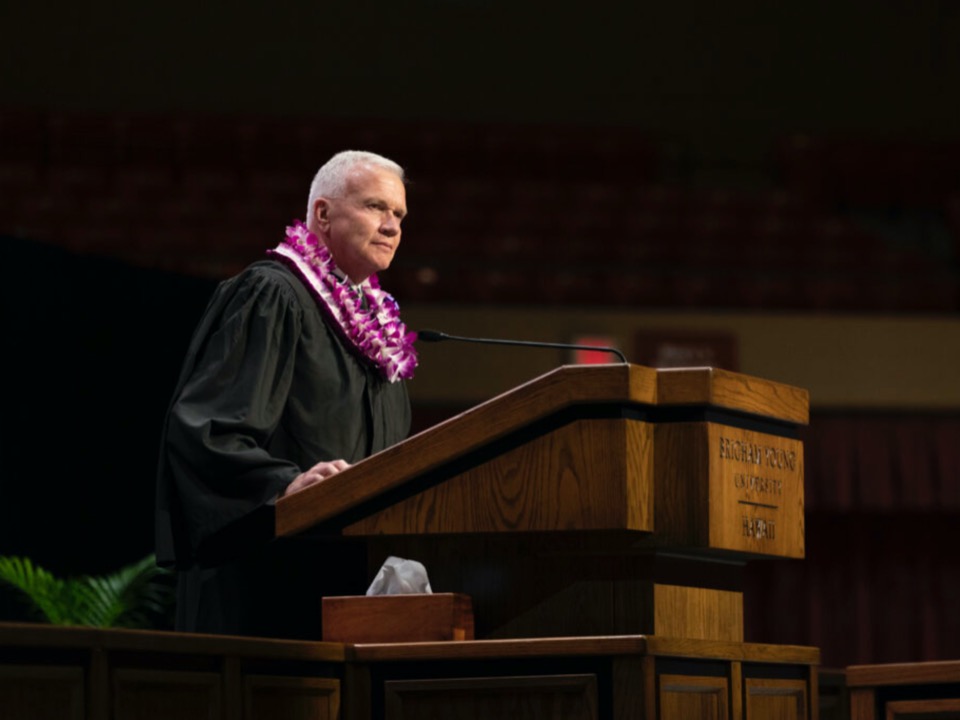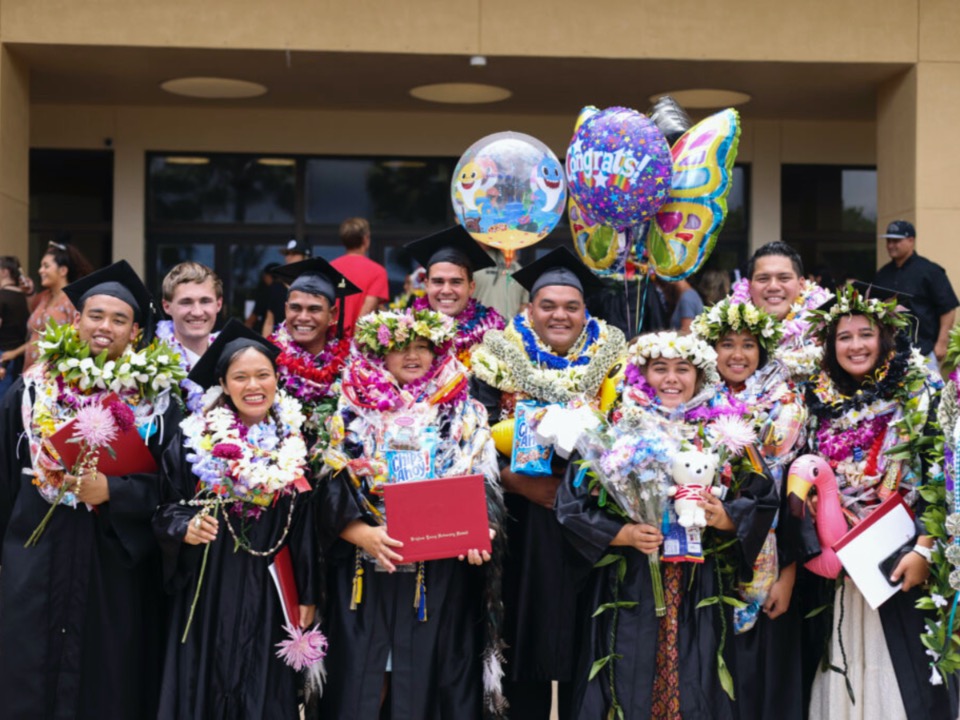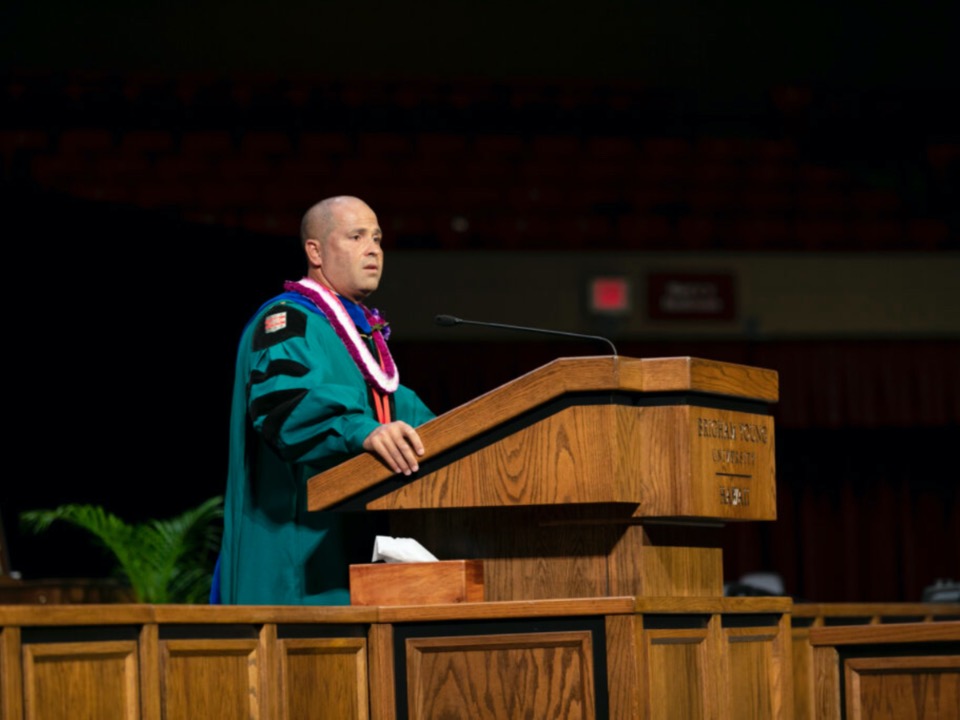
This story appears here courtesy of TheChurchNews.com. It is not for use by other media.
By Rachel Sterzer Gibson, Church News
Speaking during BYU–Hawaii’s spring commencement on Saturday, June 25, Elder Brook P. Hales reflected on his own college graduation more than 40 years ago.
“As I consider where I’ve been in life and where I am currently, I’ve thought of things that I now understand better,” the General Authority Seventy said.
He then offered a simple graduation gift to the 186 graduates gathered in the Cannon Activities Center on the Laie, Hawaii, campus — three insights he has gained through “the school of hard knocks.”
1. ‘Whatever Is, Is Right’
English poet Alexander Pope in “An Essay on Man” coined the phrase, “Whatever is, is right.” Some could be tempted to interpret the phrase to mean that whatever happens to them, good or bad, is supposed to be and they are powerless to change it, Elder Hales said.
For himself, however, the phrase means that “rather than bemoaning my circumstances, especially when they are beyond my control, I need to find a way to accept them and then work through them or around them.”
As individuals experience their own difficulties, they will be far more likely to work through them if they center their lives, hearts and faith on Jesus Christ, Elder Hales assured. “Life will be more peaceful for us if we accept our circumstances as they are and then we go to work to address those that we want to change.”

Everyone will have things in their lives that do not seem ideal or fair, Elder Hales said. “The challenge is to acknowledge that our life is ‘right’ because it is our reality at the present time. If we don’t like it, we seek God’s help to inspire us to have the strength and ability to change — what we can change.”
To illustrate, Elder Hales used the example of Helen Keller, who, after an illness as a young child, became both deaf and blind.
Despite great trials, she earned a bachelor’s degree, became a contributor to many magazines and newspapers, received international recognition and traveled the world as an advocate for the blind. She accepted the situation for what it was, made the most of it and accomplished great things, Elder Hales said.
“Life will be less stressful, less frustrating and we will be happier people if we can learn that ‘whatever is, is right’ and then go to work to improve what we can improve, accept those things we can’t change and then make the most of them.”
2. Repentance Should Be Sought After, Not Run From
The Bible Dictionary definition of “repentance” is hopeful, encouraging and a happy principle, Elder Hales pointed out. Repentance “denotes a change of mind, a fresh view about God, about oneself and about the world.”
He shared the words of President Russell M. Nelson, who has called repentance liberating, ennobling and crucial.
“It is the key to happiness and peace of mind. When coupled with faith, repentance opens our access to the power of the Atonement of Jesus Christ. … Repentance is the key to avoiding misery inflicted by the traps of the adversary” (April 2019 general conference).
Those who sincerely repent restore what is in their power to restore, Elder Hales said.
To those who may not be able to do much about restoration, Elder Hales said, “Please be assured that the restitution we can’t make personally is graciously covered by the Atonement of Jesus Christ.”

3. Trust the Lord to Deliver Us
Elder Hales noted that graduates are “commencing” into a world of great turmoil and distress.
While the United States is not at war in the traditional sense, he said, “worldwide we are involved in a very fierce war — perhaps the fiercest in our history — the war between good and evil.”
Elder Hales said he hopes his listeners will be like Captain Moroni in the Book of Mormon and find joy in liberty and freedom.
“To do that, each of us will need to be firm in the faith of Christ, ready to do his or her part to ensure that a complete, eventual victory over evil through Jesus Christ will be ours. This war of good versus evil may be our great trial — indeed, it is a war that will intensify and will be waged until the Savior’s return.”
Elder Hales testified that despite world conditions, “We need not fear. We can have peace in our hearts and in our homes. We can trust fully in the Lord’s promise that we will be delivered.”
How does an individual develop that faith or trust? Elder Hales quoted St. Francis de Sales, a French Catholic bishop who lived in the 16th century.
“Do not look forward to what may happen tomorrow; the same everlasting Father who cares for you today will take care of you tomorrow and every day. Either He will shield you from suffering, or He will give you unfailing strength to bear it. Be at peace, then. Put aside all anxious thoughts and imaginations and say continually: ‘The Lord is my strength and my shield. My heart has trusted in him and I am helped. He is not only with me but in me, and I in Him.’”
In conclusion, Elder Hales said, “Dear graduates of BYU–Hawaii, my sincere hope is that these three simple gifts will benefit you. I hope that you will learn — in your relative youth — the blessing of accepting life as it comes, and with the help of the Lord changing those things you can change, repenting as often as necessary, and trusting the Lord completely.”

Divine Identity
In his remarks to graduates, BYU–Hawaii President John S.K. Kauwe III spoke of listening to President Nelson’s Worldwide Devotional for Young Adults earlier this year.
In that address, President Nelson urged listeners to understand three fundamental truths: “First, know the truth about who you are; second, know the truth about what Heavenly Father and His Son have offered you; and third, know the truth related to your conversion.”
President Nelson also taught that first and foremost, each individual is a child of God, a child of the covenant and a disciple of Jesus Christ.
After hearing President Nelson’s talk, President Kauwe said he reflected on how he labels himself, how he might prompt others to label him and the priority he gives each label.
His Instagram account, for example, was missing all three of the most important labels, he said: a child of God, a child of the covenant and a disciple of Jesus Christ.
He has since updated his profile to say “Child of God and disciple of Jesus Christ; Husband, Father, President of BYU–Hawaii, Kanaka maoli, waterman.”
President Kauwe urged graduates to remember these three designations and ensure that the labels they embrace are properly prioritized and fully compatible with them.
“Your education at BYU–Hawaii has been centered around the three truths that President Nelson talked about in his devotional. You are prepared to embrace and prioritize your identity as a child of God, child of the covenant and disciple of Christ,” President Kauwe said.
BYU–Hawaii awarded 186 degrees Saturday: 178 bachelor’s degrees, seven associate degrees and one teaching certificate. Known for its international student body, the school’s Spring 2022 graduates hailed from 28 countries and 20 U.S. states.
Copyright 2022 Deseret News Publishing Company.